精选英语五大基本句型练习
- 格式:doc
- 大小:28.00 KB
- 文档页数:5
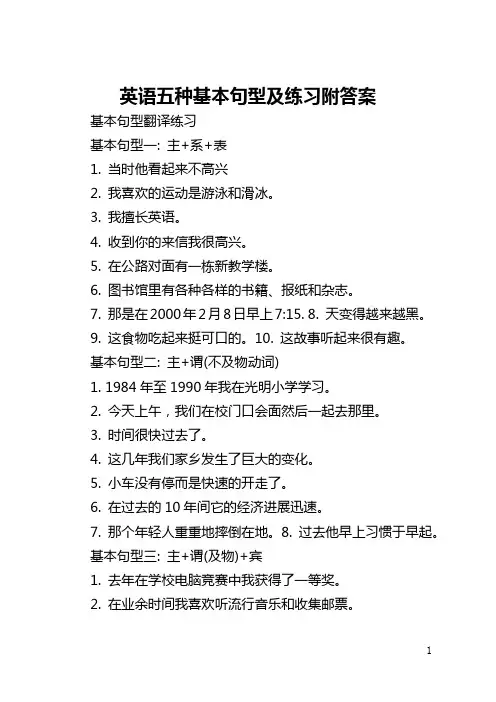
英语五种基本句型及练习附答案基本句型翻译练习基本句型一: 主+系+表1. 当时他看起来不高兴2. 我喜欢的运动是游泳和滑冰。
3. 我擅长英语。
4. 收到你的来信我很高兴。
5. 在公路对面有一栋新教学楼。
6. 图书馆里有各种各样的书籍、报纸和杂志。
7. 那是在2000年2月8日早上7:15. 8. 天变得越来越黑。
9. 这食物吃起来挺可口的。
10. 这故事听起来很有趣。
基本句型二: 主+谓(不及物动词)1. 1984年至1990年我在光明小学学习。
2. 今天上午,我们在校门口会面然后一起去那里。
3. 时间很快过去了。
4. 这几年我们家乡发生了巨大的变化。
5. 小车没有停而是快速的开走了。
6. 在过去的10年间它的经济进展迅速。
7. 那个年轻人重重地摔倒在地。
8. 过去他早上习惯于早起。
基本句型三: 主+谓(及物)+宾1. 去年在学校电脑竞赛中我获得了一等奖。
2. 在业余时间我喜欢听流行音乐和收集邮票。
3.几天前我和我兄弟骑自行车去看电影。
4. 我们也在校园内和周围种上了许多树。
5. 晚上时,我可以看电视新闻或看报纸。
6. 在回家的路上他把钱给丢了。
7. 昨晚大约九点的时候,我正在做作业。
8. 才艺展示(Tlent Show)将于6月18日在电视XX举行。
9. 下午,我将带你们转转,看一看一些名胜。
10. 盼望能尽早见到你。
基本句型四: 主+谓(及物)+双宾(间宾+直宾)1. 去年王老师教我们英语。
2. 明天我要给他写封信,告诉他这个好消息。
3. 他们给他提供了一份工作,但他拒绝了。
4. 在我14岁生日时,爸爸给我买了一辆新自行车。
5. 昨晚我花了两小时才完成作业。
6. 对不起,能问你一个问题吗?基本句型五: 主+谓(及物)+复合宾语(宾+宾补)1. 当时我看到那些孩子在河边玩。
2. 我们正在使我们的GJ变得越来越美丽。
3. 当我到达教室时,我发现里边没有人。
4. 昨天下午在公交车上我的钱包让人给偷了。
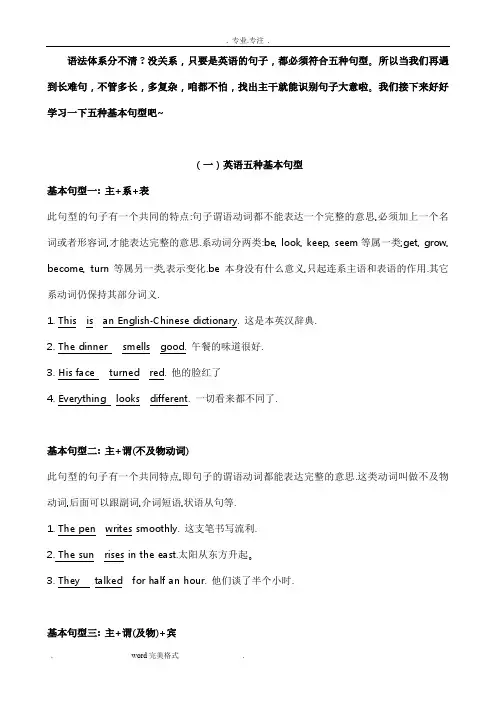
语法体系分不清?没关系,只要是英语的句子,都必须符合五种句型。
所以当我们再遇到长难句,不管多长,多复杂,咱都不怕,找出主干就能识别句子大意啦。
我们接下来好好学习一下五种基本句型吧~(一)英语五种基本句型基本句型一: 主+系+表此句型的句子有一个共同的特点:句子谓语动词都不能表达一个完整的意思,必须加上一个名词或者形容词,才能表达完整的意思.系动词分两类:be, look, keep, seem等属一类;get, grow, become, turn等属另一类,表示变化.be 本身没有什么意义,只起连系主语和表语的作用.其它系动词仍保持其部分词义.1. This is an English-Chinese dictionary. 这是本英汉辞典.2. The dinner smells good. 午餐的味道很好.3. His face turned red. 他的脸红了4. Everything looks different. 一切看来都不同了.基本句型二: 主+谓(不及物动词)此句型的句子有一个共同特点,即句子的谓语动词都能表达完整的意思.这类动词叫做不及物动词,后面可以跟副词,介词短语,状语从句等.1. The pen writes smoothly. 这支笔书写流利.2. The sun rises in the east.太阳从东方升起。
3. They talked for half an hour. 他们谈了半个小时.基本句型三: 主+谓(及物)+宾此句型句子的共同特点是:谓语动词都具有实义,都是主语产生的动作,但不能表达完整的意思,必须跟有一个宾语,即动作的承受者,才能使意思完整.这类动词叫做及物动词.1. Who knows the answer?谁知道答案?2. He enjoys reading. 他喜欢看书.3. My sister is writing a letter at this moment. 我妹妹此刻正在写一封信。
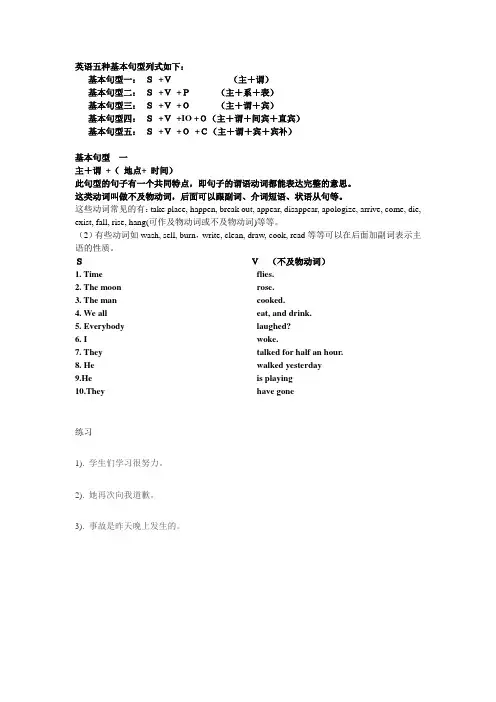
英语五种基本句型列式如下:基本句型一:S+V(主+谓)基本句型二:S+V+P(主+系+表)基本句型三:S+V+O(主+谓+宾)基本句型四:S+V+IO +O(主+谓+间宾+直宾)基本句型五:S+V+O+C(主+谓+宾+宾补)基本句型一主+谓+(地点+ 时间)此句型的句子有一个共同特点,即句子的谓语动词都能表达完整的意思。
这类动词叫做不及物动词,后面可以跟副词、介词短语、状语从句等。
这些动词常见的有:take place, happen, break out, appear, disappear, apologize, arrive, come, die, exist, fall, rise, hang(可作及物动词或不及物动词)等等。
(2)有些动词如wash, sell, burn,write, clean, draw, cook, read等等可以在后面加副词表示主语的性质。
SV(不及物动词)1. Time2. The moon3. The man4. We all5. Everybody6. I7. They8. He9.He10.They flies.rose.cooked.eat, and drink. laughed?woke.talked for half an hour. walked yesterdayis playinghave gone练习1). 学生们学习很努力。
_____________________________________2). 她再次向我道歉。
_______________________________________3). 事故是昨天晚上发生的。
_____________________________________基本句型二主+系+表+(地点+ 时间)此句型的句子有一个共同的特点:句子谓语动词都不能表达一个完整的意思,必须加上一个表明主语身份或状态的表语构成复合谓语,才能表达完整的意思。
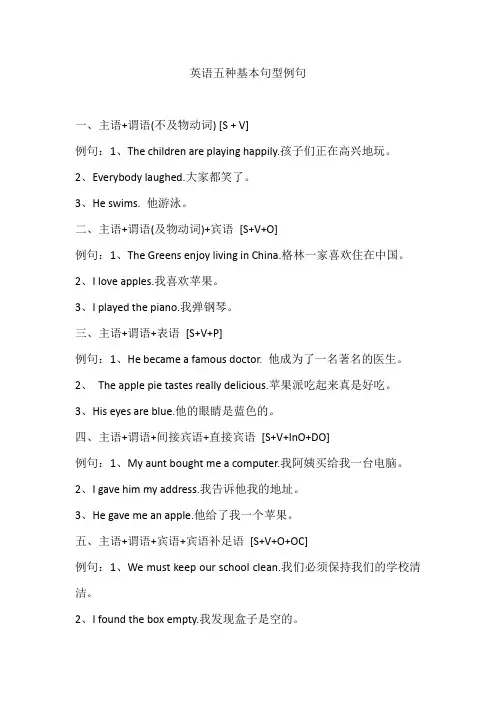
英语五种基本句型例句
一、主语+谓语(不及物动词) [S + V]
例句:1、The children are playing happily.孩子们正在高兴地玩。
2、Everybody laughed.大家都笑了。
3、He swims. 他游泳。
二、主语+谓语(及物动词)+宾语[S+V+O]
例句:1、The Greens enjoy living in China.格林一家喜欢住在中国。
2、I love apples.我喜欢苹果。
3、I played the piano.我弹钢琴。
三、主语+谓语+表语[S+V+P]
例句:1、He became a famous doctor. 他成为了一名著名的医生。
2、The apple pie tastes really delicious.苹果派吃起来真是好吃。
3、His eyes are blue.他的眼睛是蓝色的。
四、主语+谓语+间接宾语+直接宾语[S+V+InO+DO]
例句:1、My aunt bought me a computer.我阿姨买给我一台电脑。
2、I gave him my address.我告诉他我的地址。
3、He gave me an apple.他给了我一个苹果。
五、主语+谓语+宾语+宾语补足语[S+V+O+OC]
例句:1、We must keep our school clean.我们必须保持我们的学校清洁。
2、I found the box empty.我发现盒子是空的。
3、I find the clock broken.我看到钟表坏了。
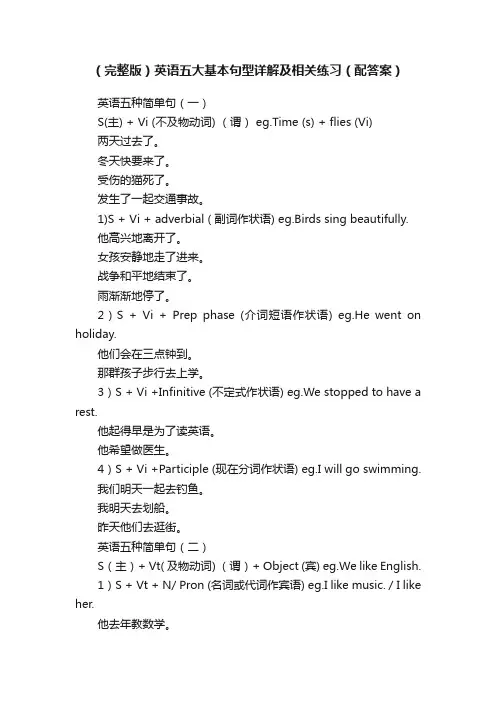
(完整版)英语五大基本句型详解及相关练习(配答案)英语五种简单句(一)S(主) + Vi (不及物动词) (谓) eg.Time (s) + flies (Vi)两天过去了。
冬天快要来了。
受伤的猫死了。
发生了一起交通事故。
1)S + Vi + adverbial ( 副词作状语) eg.Birds sing beautifully.他高兴地离开了。
女孩安静地走了进来。
战争和平地结束了。
雨渐渐地停了。
2)S + Vi + Prep phase (介词短语作状语) eg.He went on holiday.他们会在三点钟到。
那群孩子步行去上学。
3)S + Vi +Infinitive (不定式作状语) eg.We stopped to have a rest.他起得早是为了读英语。
他希望做医生。
4)S + Vi +Participle (现在分词作状语) eg.I will go swimming.我们明天一起去钓鱼。
我明天去划船。
昨天他们去逛街。
英语五种简单句(二)S(主)+ Vt( 及物动词) (谓)+ Object (宾) eg.We like English.1)S + Vt + N/ Pron (名词或代词作宾语) eg.I like music. / I like her.他去年教数学。
我们已收到了他们的来信。
2)S + Vt + Infinitive (不定式作宾语) eg. I want to help him.他爸爸期待拥有一家工厂。
他们假装在看书。
我尝试去解决那个问题。
常用于这个句型的动词有:attempt ,dare ,decide, desire, expect, hope, wish, intend, learn, need, offer, pretend, promise, propose, refuse, want, manage, plan, fail, try, agree等。
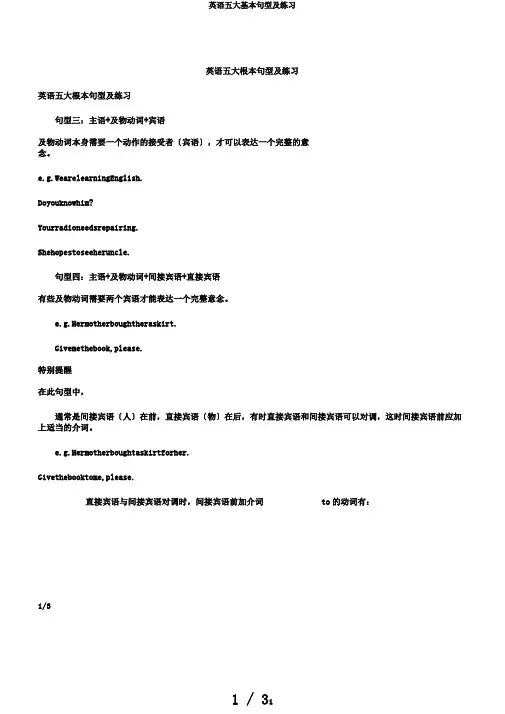
英语五大根本句型及练习英语五大根本句型及练习句型三:主语+及物动词+宾语及物动词本身需要一个动作的接受者〔宾语〕,才可以表达一个完整的意念。
e.g.WearelearningEnglish.Doyouknowhim?Yourradioneedsrepairing.Shehopestoseeheruncle.句型四:主语+及物动词+间接宾语+直接宾语有些及物动词需要两个宾语才能表达一个完整意念。
e.g.Hermotherboughtheraskirt.Givemethebook,please.特别提醒在此句型中,通常是间接宾语〔人〕在前,直接宾语〔物〕在后,有时直接宾语和间接宾语可以对调,这时间接宾语前应加上适当的介词。
e.g.Hermotherboughtaskirtforher.Givethebooktome,please.直接宾语与间接宾语对调时,间接宾语前加介词to的动词有:1/3give(给),tell(告诉),lend(借给),sell(卖),teach(教),send(寄给),write(写给),show(出示),return(还给),bring(带给),pass(递给),leave(留给),offer(提供),hand(交给)间接宾语前加介词for的动词有:buy(买),choose(选择),get(弄到),make(做),order(订购),sing(唱歌),do(做),play(演奏)如果直接宾语为人称代词那么必须把直接宾放在间接宾语前,且间接宾语前要加上适当的介词。
e.g.Ihandedittoourteacher.不能说:Ihandedourteacherit.此句型变为被动语态时,可分为两种情况。
e.g.Hermotherboughtheraskirt.a.Shewasboughtaskirtbyhermother.b.Askirtwasboughtforherbyhermother.句型五:主语+及物动词+宾语+宾语补足语及物动词本身需要一个宾语外,还需要一个名词,形容词,副词,动词不定式,分词来补充说明宾语,才能表达一个完整的意念。
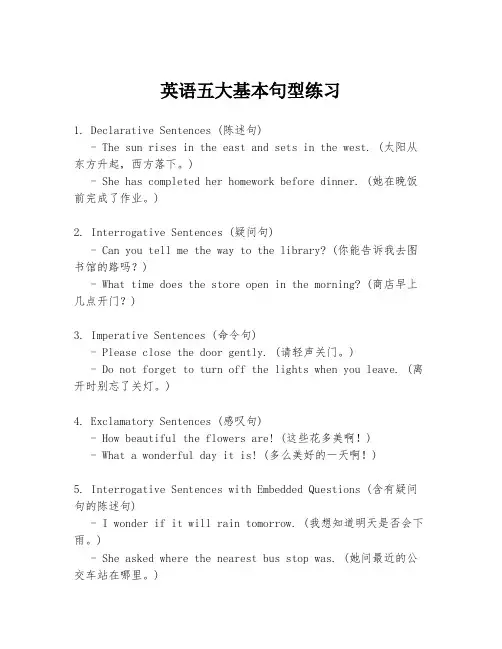
英语五大基本句型练习1. Declarative Sentences (陈述句)- The sun rises in the east and sets in the west. (太阳从东方升起,西方落下。
)- She has completed her homework before dinner. (她在晚饭前完成了作业。
)2. Interrogative Sentences (疑问句)- Can you tell me the way to the library? (你能告诉我去图书馆的路吗?)- What time does the store open in the morning? (商店早上几点开门?)3. Imperative Sentences (命令句)- Please close the door gently. (请轻声关门。
)- Do not forget to turn off the lights when you leave. (离开时别忘了关灯。
)4. Exclamatory Sentences (感叹句)- How beautiful the flowers are! (这些花多美啊!)- What a wonderful day it is! (多么美好的一天啊!)5. Interrogative Sentences with Embedded Questions (含有疑问句的陈述句)- I wonder if it will rain tomorrow. (我想知道明天是否会下雨。
)- She asked where the nearest bus stop was. (她问最近的公交车站在哪里。
)。
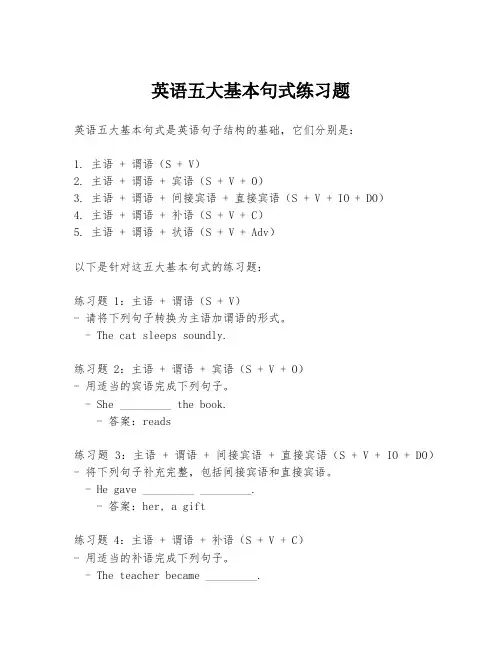
英语五大基本句式练习题英语五大基本句式是英语句子结构的基础,它们分别是:1. 主语 + 谓语(S + V)2. 主语 + 谓语 + 宾语(S + V + O)3. 主语 + 谓语 + 间接宾语 + 直接宾语(S + V + IO + DO)4. 主语 + 谓语 + 补语(S + V + C)5. 主语 + 谓语 + 状语(S + V + Adv)以下是针对这五大基本句式的练习题:练习题 1:主语 + 谓语(S + V)- 请将下列句子转换为主语加谓语的形式。
- The cat sleeps soundly.练习题 2:主语 + 谓语 + 宾语(S + V + O)- 用适当的宾语完成下列句子。
- She _________ the book.- 答案:reads练习题 3:主语 + 谓语 + 间接宾语 + 直接宾语(S + V + IO + DO)- 将下列句子补充完整,包括间接宾语和直接宾语。
- He gave _________ _________.- 答案:her, a gift练习题 4:主语 + 谓语 + 补语(S + V + C)- 用适当的补语完成下列句子。
- The teacher became _________.- 答案:angry练习题 5:主语 + 谓语 + 状语(S + V + Adv)- 用适当的状语完成下列句子。
- The children played _________.- 答案:outside练习题 6:混合句式- 将下列句子转换为混合句式,包括主语、谓语、宾语和状语。
- The dog barked loudly at the mailman.- 转换为:The dog barked at the mailman loudly.练习题 7:选择正确的句子结构- 从下列选项中选择正确的句子结构,并解释为什么。
- A. 主语 + 谓语- B. 主语 + 谓语 + 宾语- C. 主语 + 谓语 + 补语- D. 主语 + 谓语 + 状语- The sun rises in the east.- 正确答案:A练习题 8:填空题- 用适当的词填空,使句子完整。

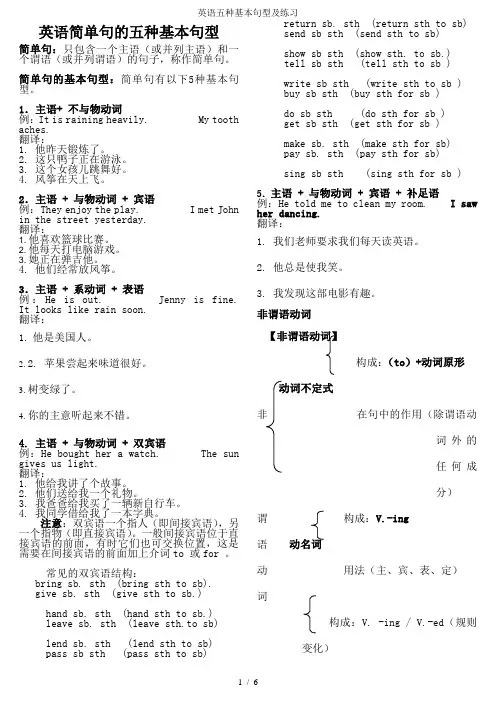
英语简单句的五种基本句型简单句:只包含一个主语(或并列主语)和一个谓语(或并列谓语)的句子,称作简单句。
简单句的基本句型:简单句有以下5种基本句型。
1.主语+ 不与物动词 例:It is raining heavily. My tooth aches. 翻译:1. 他昨天锻炼了。
2. 这只鸭子正在游泳。
3. 这个女孩儿跳舞好。
4. 风筝在天上飞。
2.主语 + 与物动词 + 宾语 例:They enjoy the play. I met John in the street yesterday. 翻译:1. 他喜欢篮球比赛。
2. 他每天打电脑游戏。
3. 她正在弹吉他。
4. 他们经常放风筝。
3.主语 + 系动词 + 表语例:He is out. Jenny is fine. It looks like rain soon.翻译:1. 他是美国人。
2. 2. 苹果尝起来味道很好。
3. 树变绿了。
4. 你的主意听起来不错。
4. 主语 + 与物动词 + 双宾语例:He bought her a watch. The sun gives us light. 翻译:1. 他给我讲了个故事。
2. 他们送给我一个礼物。
3. 我爸爸给我买了一辆新自行车。
4. 我同学借给我了一本字典。
注意:双宾语一个指人(即间接宾语),另一个指物(即直接宾语)。
一般间接宾语位于直接宾语的前面,有时它们也可交换位置,这是需要在间接宾语的前面加上介词to 或for 。
常见的双宾语结构:bring sb. sth (bring sth to sb). give sb. sth (give sth to sb.)hand sb. sth (hand sth to sb.) leave sb. sth (leave sth.to sb) lend sb. sth (lend sth to sb) pass sb sth (pass sth to sb)return sb. sth (return sth to sb) send sb sth (send sth to sb)show sb sth (show sth. to sb.)tell sb sth (tell sth to sb ) write sb sth (write sth to sb ) buy sb sth (buy sth for sb ) do sb sth (do sth for sb ) get sb sth (get sth for sb ) make sb. sth (make sth for sb) pay sb. sth (pay sth for sb)sing sb sth (sing sth for sb )5.主语 + 与物动词 + 宾语 + 补足语例:He told me to clean my room. I saw her dancing. 翻译:1. 我们老师要求我们每天读英语。
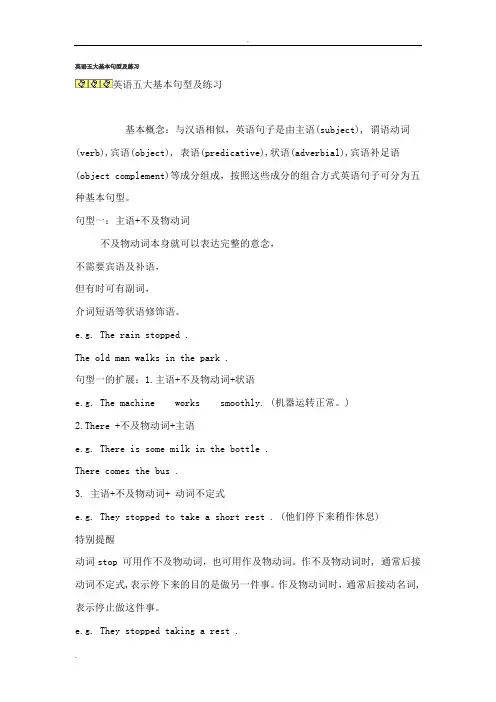
英语五大基本句型及练习英语五大基本句型及练习基本概念:与汉语相似,英语句子是由主语(subject), 谓语动词(verb),宾语(object), 表语(predicative),状语(adverbial),宾语补足语(object complement)等成分组成,按照这些成分的组合方式英语句子可分为五种基本句型。
句型一:主语+不及物动词不及物动词本身就可以表达完整的意念,不需要宾语及补语,但有时可有副词,介词短语等状语修饰语。
e.g. The rain stopped .The old man walks in the park .句型一的扩展:1.主语+不及物动词+状语e.g. The machine works smoothly. (机器运转正常。
)2.There +不及物动词+主语e.g. There is some milk in the bottle .There comes the bus .3. 主语+不及物动词+ 动词不定式e.g. They stopped to take a short rest . (他们停下来稍作休息)特别提醒动词stop 可用作不及物动词,也可用作及物动词。
作不及物动词时, 通常后接动词不定式,表示停下来的目的是做另一件事。
作及物动词时,通常后接动名词,表示停止做这件事。
e.g. They stopped taking a rest .句型二:主语+系动词+表语系动词本身不能表达完整的意念没,需要形容词,名词,介词短语等来补充说明主语,也叫主语补语。
e.g. My sister is a nurse .I feel quite hungry .The ball is under the desk .句型三:主语+及物动词+宾语及物动词本身需要一个动作的接受者(宾语),才可以表达一个完整的意念。
e.g. We are learning English .Do you know him ?Your radio needs repairing .She hopes to see her uncle.句型四:主语+及物动词+间接宾语+直接宾语有些及物动词需要两个宾语才能表达一个完整意念。
五种基本句型英语练习题一、陈述句1. He ________ (喜欢) playing football.2. My mother ________ (是) a teacher.3. The sun ________ (升起) in the east.4. They ________ (正在) having a meeting.5. I ________ (去过) Beijing twice.二、疑问句1. ________ you ________ (喜欢) music?2. ________ she ________ (是) a doctor?3. ________ it ________ (下雨) now?4. ________ they ________ (去) to the library yesterday?5. ________ he ________ (完成) his homework yet?三、否定句1. He ________ (不) like eating vegetables.3. She ________ (不能) speak English fluently.4. They ________ (不是) students.5. I ________ (没见过) him before.四、祈使句1. ________ (打开) the door, please.2. ________ (别) worry about it.3. ________ (站起来) and answer the question.4. ________ (小心) when crossing the road.5. ________ (做) your homework now.五、感叹句1. ________ (多么) beautiful the scenery is!2. ________ (多么) hard they work!3. ________ (多么) sunny day it is!4. ________ (多么) delicious the food tastes!5. ________ (多么) happy we are to see you!一、陈述句(续)6. She ________ (住在) a small town near the mountains.7. The cat ________ (正在) sleeping on the sofa.8. We ________ (计划) to go on a picnic next weekend.9. He ________ (教) English at our school.10. They ________ (修建) a new bridge over the river.二、疑问句(续)6. ________ you ________ (理解) the lesson?7. ________ he ________ (去) to the gym every morning?8. ________ she ________ (阅读) that book now?9. ________ they ________ (参观) the museum last week?10. ________ it ________ (通常) snow in your hometown?三、否定句(续)6. She ________ (不) watch TV in the evening.7. They ________ (没) arrive at the airport yet.8. I ________ (不) remember his phone number.9. He ________ (不) play basketball on weekends.10. We ________ (没) hear the news about the earthquake.四、祈使句(续)6. ________ (关上) the window before you leave.7. ________ (告诉) us your story.8. ________ (穿上) your coat, it's cold outside.9. ________ (保持) quiet in the library.10. ________ (节约) water and electricity.五、感叹句(续)6. ________ (多么) colorful the flowers are!7. ________ (多么) fast the car is going!8. ________ (多么) kindhearted she is!9. ________ (多么) tall the building is!10. ________ (多么) interesting the lecture was!答案一、陈述句1. likes2. is3. rises4. are having5. have been to二、疑问句1. Do you like2. Is she3. Is it raining4. Did they go5. Has he finished三、否定句1. doesn't like2. don't have3. can't speak4. are not5. haven't seen四、祈使句1. Open2. Don't worry3. Stand up4. Be careful5. Do五、感叹句1. How beautiful2. How hard3. What a sunny4. How delicious5. How happy一、陈述句(续)6. lives in7. is sleeping8. plan to10. have built二、疑问句(续)6. Do you understand7. Does he go8. Is she reading9. Did they visit10. Does it usually snow三、否定句(续)6. doesn't watch7. haven't arrived8. don't remember9. doesn't play10. didn't hear四、祈使句(续)6. Close7. Tell8. Put on9. Keep10. Save五、感叹句(续)6. How colorful7. How fast8. How kindhearted10. How interesting。
五个基本句型翻译练习及答案1. 句型:主语 + 动词1. 英文: The cat is sleeping.中文: 猫在睡觉。
2. 英文: They are playing basketball.中文: 他们在打篮球。
3. 英文: I am reading a book.中文: 我在读书。
2. 句型:主语 + 动词 + 宾语1. 英文: She is eating an apple.中文: 她在吃苹果。
2. 英文: He is watching TV.中文: 他在看电视。
3. 英文: We are drinking water.中文: 我们在喝水。
3. 句型:主语 + 动词 + 地点1. 英文: He is swimming in the pool.中文: 他在游泳池游泳。
2. 英文: They are dancing in the classroom.中文: 他们在教室里跳舞。
3. 英文: She is cooking in the kitchen.中文: 她在厨房做饭。
4. 句型:主语 + 动词 + 时间1. 英文: He is studying now.中文: 他现在在研究。
2. 英文: They are sleeping at 10 pm.中文: 他们晚上10点在睡觉。
3. 英文: She is working in the morning.中文: 她在早上工作。
5. 句型:主语 + 动词 + 宾语 + 地点1. 英文: We are playing soccer in the park.中文: 我们在公园里踢足球。
2. 英文: They are having a picnic on the beach. 中文: 他们在海滩上野餐。
3. 英文: She is painting in the garden.中文: 她在花园里画画。
五种基本句型英语练习题英语句子结构是英语学习中的基础,而五种基本句型是构建英语句子的基石。
以下是五种基本句型英语练习题,帮助学生加深对这些句型的理解并提高应用能力。
1. 陈述句 - 陈述句用来表达一个事实或观点。
请将下列句子转换成陈述句:- 疑问句:Are you a student?- 答案:You are a student.2. 一般疑问句 - 一般疑问句用来询问信息,需要用“是”或“否”来回答。
请将下列陈述句转换成一般疑问句,并给出肯定和否定回答: - 陈述句:She likes reading books.- 一般疑问句:Does she like reading books?- 肯定回答:Yes, she does.- 否定回答:No, she doesn't.3. 特殊疑问句 - 特殊疑问句用来询问特定的信息。
请用下列疑问词(who, what, where, when, why, how)提问,并给出相应的答案:- 陈述句:My brother goes to school by bus every day.- 疑问词:How- 特殊疑问句:How does your brother go to school every day? - 答案:He goes to school by bus.4. 祈使句 - 祈使句用来提出请求或命令。
请根据下列情境写出相应的祈使句:- 情境:提醒某人不要忘记带伞。
- 祈使句:Don't forget to bring your umbrella.5. 感叹句 - 感叹句用来表达强烈的情感。
请将下列陈述句转换成感叹句:- 陈述句:The view from the mountain is beautiful.- 感叹句:What a beautiful view from the mountain!练习题答案:1. You are a student.2. Does she like reading books? Yes, she does. No, she doesn't.3. How does your brother go to school every day? He goes to school by bus.4. Don't forget to bring your umbrella.5. What a beautiful view from the mountain!通过练习这些基本句型,学生可以更好地掌握英语句子的构造,为进一步的英语学习打下坚实的基础。
英语五大基本句型及练习英语五大基本句型及练习基本概念:与汉语相似,英语句子是由主语(subject), 谓语动词(verb),宾语(object), 表语(predicative),状语(adverbial),宾语补足语(object complement)等成分组成,按照这些成分的组合方式英语句子可分为五种基本句型。
句型一:主语+不及物动词不及物动词本身就可以表达完整的意念,不需要宾语及补语,但有时可有副词,介词短语等状语修饰语。
e.g. The rain stopped .The old man walks in the park .句型一的扩展:1.主语+不及物动词+状语e.g. The machine works smoothly. (机器运转正常。
)2.There +不及物动词+主语e.g. There is some milk in the bottle .There comes the bus .3. 主语+不及物动词+ 动词不定式e.g. They stopped to take a short rest . (他们停下来稍作休息)特别提醒动词stop 可用作不及物动词,也可用作及物动词。
作不及物动词时, 通常后接动词不定式,表示停下来的目的是做另一件事。
作及物动词时,通常后接动名词,表示停止做这件事。
e.g. They stopped taking a rest .句型二:主语+系动词+表语系动词本身不能表达完整的意念没,需要形容词,名词,介词短语等来补充说明主语,也叫主语补语。
e.g. My sister is a nurse .I feel quite hungry .The ball is under the desk .句型三:主语+及物动词+宾语及物动词本身需要一个动作的接受者(宾语),才可以表达一个完整的意念。
e.g. We are learning English .Do you know him ?Your radio needs repairing .She hopes to see her uncle.句型四:主语+及物动词+间接宾语+直接宾语有些及物动词需要两个宾语才能表达一个完整意念。
英语五大基本句型基本概念:与汉语相似,英语句子是由主语(subject), 谓语动词(verb),宾语(object), 表语(predicative),状语(adverbial),宾语补足语(object complement)等成分组成,按照这些成分的组合方式英语句子可分为五种基本句型。
句型一:主语+不及物动词不及物动词本身就可以表达完整的意念,不需要宾语及补语,但有时可有副词,介词短语等状语修饰语。
e.g. The rain stopped .The old man walks in the park .句型一的扩展:1.主语+不及物动词+状语e.g. The machine works smoothly. (机器运转正常。
)2.There +不及物动词+主语e.g. There is some milk in the bottle .There comes the bus .3. 主语+不及物动词+ 动词不定式e.g. They stopped to take a short rest . (他们停下来稍作休息)特别提醒:动词stop 可用作不及物动词,也可用作及物动词。
作不及物动词时, 通常后接动词不定式,表示停下来的目的是做另一件事。
作及物动词时,通常后接动名词,表示停止做这件事。
e.g. They stopped taking a rest .句型二:主语+系动词+表语系动词本身不能表达完整的意念没,需要形容词,名词,介词短语等来补充说明主语,也叫主语补语。
e.g. My sister is a nurse .I feel quite hungry .The ball is under the desk .句型三:主语+及物动词+宾语及物动词本身需要一个动作的接受者(宾语),才可以表达一个完整的意念。
e.g. We are learning English .Do you know him ?Your radio needs repairing .She hopes to see her uncle.句型四:主语+及物动词+间接宾语+直接宾语有些及物动词需要两个宾语才能表达一个完整意念。
e.g. Her mother bought her a skirt.Give me the book, please.特别提醒A. 在此句型中,通常是间接宾语(人)在前,直接宾语(物)在后,有时直接宾语和间接宾语可以对调,这时间接宾语前应加上适当的介词。
e.g. Her mother bought a skirt for her .Give the book to me , please .直接宾语与间接宾语对调时,间接宾语前加介词to的动词有:give(给), tell(告诉) , lend(借给) , sell(卖), teach(教) , send(寄给), write(写给), show(出示) , return(还给), bring(带给), pass(递给), leave(留给), offer(提供), hand(交给)间接宾语前加介词for的动词有:buy(买), choose(选择), get (弄到), make(做), order(订购), sing (唱歌), do (做), play(演奏)B. 如果直接宾语为人称代词那么必须把直接宾放在间接宾语前,且间接宾语前要加上适当的介词。
e.g. I handed it to our teacher .不能说:I handed our teacher it .C. 此句型变为被动语态时,可分为两种情况。
e.g. Her mother bought her a skirt .a. She was bought a skirt by her mother .b. A skirt was bought for her by her mother.句型五:主语+及物动词+宾语+宾语补足语及物动词本身需要一个宾语外,还需要一个名词,形容词,副词, 动词不定式,分词来补充说明宾语,才能表达一个完整的意念。
e.g. We elected Li Yang our monitor.The news made us sad.She saw the thief steal into the shop .The teacher asked me to answer the question .I found the man stealing the money .I found my money stolen .特别提醒A.现在分词为宾语补足语时,宾语与现在分词之间是主动关系;过去分词为宾语补足语时,宾语与过去分词之间是被动关系。
B.在let(让),make(使得),have(请,让,使得),see(看),hear(听到),watch(观看),feel(感觉到),listen to (倾听),look at (看到),notice(注意到)等动词后的宾语补足语如果为不定式,则省掉”to”,但变为被动语态时,则要带”to”.e.g. We hear her sing next door.She is heard to sing next door .C.此句型变为被动语态时,只有一种情况。
e.g. They saw him steal the old man’s money.He was seen to steal the old man’s money .英语五大基本句型练习1.I am sorry to have kept you ____.a. waitb. to waitc. waitingd. waited2.She found her dog ___over by a car on the road.a. runb. ran d. to run d. running3. Rose is going to have her hair _____.a. dob. donec. didd. doing4. She felt somebody ___her.a. touchedb. touchesc. touchd. to touch5. She taught him _____speak English.a. howb. how could hec. how he couldd. how to6.He didn’t enjoy the play because he ____.a. was boringb. boredc. was boredd. boring7.I will make your dream ____.a. comes trueb. to come truec. coming trulyd. come true8.He warned ____home .a. us to not gob. us not to goc. we not god. us not go9. Canned food does not go ____.a. bed easilyb. badly easyc. bad easyd. badly easily10.The sad news kept her ___all the night.a. awakeb. wakenc. waked. to wake11.I think ____a bad habit to get up late .a. thatb. itc. thisd. its12.He found his money _____.a. stealb. stealingc. stolend. to steal13.Roses in bloom smell ____.a. sweetlyb. sweetc. sweetend. sweetness14.We must have the machine ____.a. to repairb. repairingc. repaird. repaired15.She was lying in the sofa ____a book.a. readingb. readc. to readd. to reading16.A television set will keep us ____of the news of the day.a. informb. to informc. informedd. informing17.The speaker found himself ____all alone.a. leftb. leavec. leavingd. to leave18.The speaker found himself ____.a. misunderstandb. misunderstandingc. misunderstoodd. to misunderstand19.-My watch is broken.–Why don’t you ___.a. take a repairer your watchb. take your watch a repairerc. take to a repairer itd. take it to a repairer20.I heard you went to the museum yesterday and couldn’t find ____the hotel.a. how to return tob. how you could go forc. the way back ford. the way back to21.Yesterday was my birthday. My mother ____.a. made a cake to meb. made a cake mec. made for me a caked. made me a cake22. The teacher ____John a good student.a. believesb. knowsc. suggestsd. considers23.It’s a fine day. Let’s go boating, ___?a. will web. don’t wec. won’t wed. shall we24.Don’t smoke in the classroom, ___?a. will youb. do youc. don’t youd. won’t you25.He seldom has lunch at home, ____he?a. hasb. hasn’tc. doesd. doesn’t26.We had to get up early, ___we?a. didn’tb. don’tc. hadd. did27.You had Tom do the job, ____you?a. didb. didn’tc. hadd. hadn’t28.Let us have another look, ____you?a. willb. wouldc. won’td. wouldn’t29.Nobody came, ___?a. didn’t heb. didn’t theyc. did hed. did they30.We ought to hand it in today, ____we?a. oughtn’tb. don’tc. shouldn’td. won’t31.We’d better wait for ten more minutes, ___?a. hadn’t web. don’t wec. didn’t wed. wouldn’t we32. I’d like a sandwich, ____?a. would youb. do youc. couldn’t youd. don’t you33.This is the third time this week John has had to study late, ___?a. hasn’t heb. isn’t hec. hasn’t itd. isn’t it34.You and I did it together, ___?a. didn’t Ib. didn’t youc. did youd. didn’t we35.They should have completed it earlier, ____?a. should theyb. shouldn’t theyc. have theyd. haven’t they36. You may take it if you want to, ___?a. mayn’t youb. don’t youc. shouldn’t youd. won’t you37.You must have told Mr. Smith the secret, ___?a. mustn’t youb. must youc. haven’t youd. have you38.She disliked the skirt his father bought her, ___?a. did sheb. didn’t shec. was shed. wasn’t she39.Tom said he was not there then, ___?a. didn’t heb. did hec. wasn’t hed. was he40. I suppose he is honest , ___?a. don’t Ib. do I C. isn’t he d. is he41. I don’t think he is serious, ___?a. don’t Ib. do I C. isn’t he d. is he42.She’s finished the job, ____she ?a. doesn’tb. isn’tc. wasn’td. hasn’t43. –You aren’t a teacher, are you?a. Yes, I am notb. No, I amc. No, but I wasd. Yes, I wasn’t44.- ____is your sister?-She is a teacher in a middle school.a. Whob. Whatc. Whichd. Where45.-How are your parents? -_____.a. They are doctorsb. They like sweet foodc. They are fined. They are fifty46. -___will you get married to him. -In a month.a. How soonb. How longc. How oftend. How much47. There ____two films this week in our school.a. isb. havec. have beend. has48. There ____a lot of news about the fire on TV last night.a. wasb. hadc. wered. is49.There used to be a temple there, ____?a. usedn’t itb. used therec. didn’t itd. didn’t there50. There ___ a stream in front of our house.a. liesb. hasc. standd. lie。